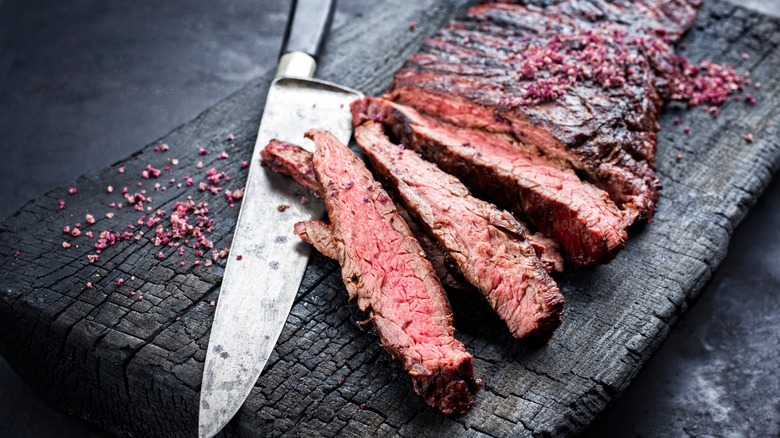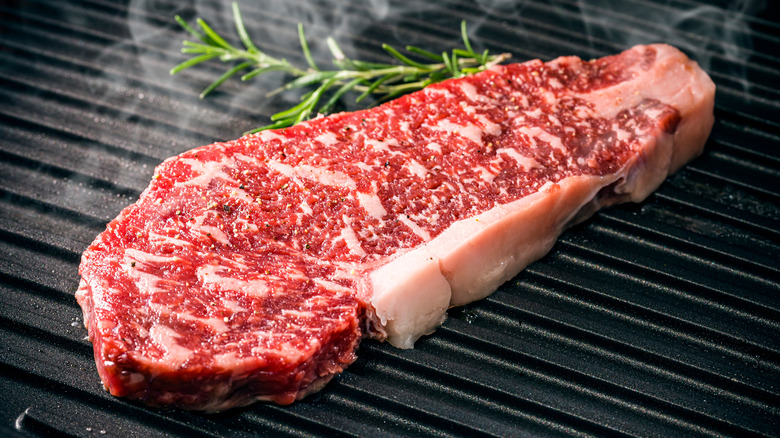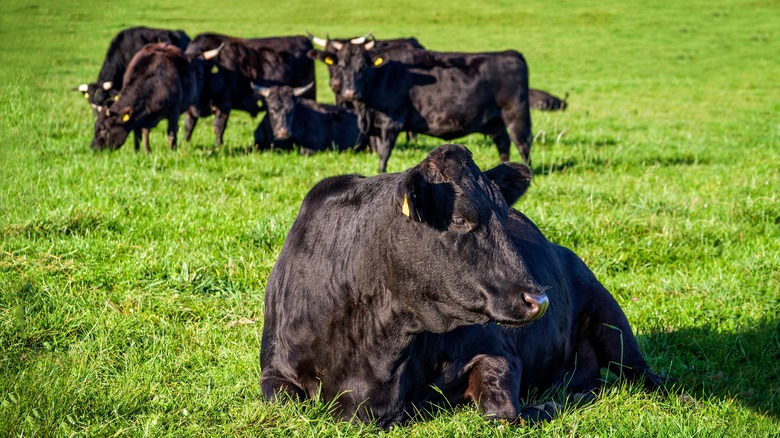The Pricey Difference Between American And Japanese Wagyu Steak
Steak devotees have plenty to debate, from the best cuts of beef to the ultimate cooking methods, marinades, and grilling secrets. You can bet there's some passionate discourse happening at outdoor barbecues, indoor kitchens, and many a grill-meister cook-off competition. There's one thing, however, that most chefs can heartily agree on — the superiority of wagyu beef. With heavily marbled, succulent meat that's tender, moist, and deeply flavored, steaks from wagyu cattle are highly coveted despite a relatively steep price tag.
It's universally known that wagyu beef is of Japanese origin, with even the term itself translating as "Japanese cow." But the distinction isn't quite as black-and-white as it sounds. By the time consumers in the United States pick up wagyu beef steaks at the market or order them in a restaurant, they've been classified as either Japanese wagyu or American wagyu, with a sometimes significant disparity in cost.
Japanese wagyu beef, if you can even find the true version of it outside of Japan, is much more costly. That's because it comes from purebred cattle with very strict breeding, feeding, and processing requirements. Also, per Japanese law, the Japanese cattle cannot be exported from Japan. Producers of American wagyu beef are allowed to use the name as long as the cattle have authentic Japanese wagyu genes, though with some exceptions, they've almost always been crossbred with other types of American cattle.
What are Japanese wagyu steaks?
Japanese wagyu steaks come from one of four breeds of cattle in Japan, including the most prevalent one, the Japanese Black, known in Japan as Kurogewashu. Exportation of all four wagyu breeds are now restricted by law, ensuring the premium quality and purity of the genes. Living conditions for the cattle are very strict, including eating high-quality grains and plants, having access to clean open spaces and fresh air, and maintaining healthy, low-stress lifestyles.
Many of the highest-quality wagyu brands hail from the Kansai region of Japan, with traceable bloodlines producing specific flavors and characteristics. Because of things like fat melting points, you end up with rich, tender, moist meat with a buttery taste. One of the most well-known of these wagyu brands is Kobe beef, which comes exclusively from cattle in the Hyogo Prefecture. They feed on specific types of corn and rice, resulting in identifiable sweet tastes and rich marbling in the meat.
All wagyu in Japan are graded with BMS ratings and letter and number combinations, with A4 and A5 indicating the ultimate in quality, flavor, fat, marbling, and texture. As you can imagine, all of this comes at a cost to the producer and ultimately to the consumer. The exclusive nature of purebred Japanese wagyu adds to the mystique, playing into the price point, which can be up to a whopping $200 per pound or even higher for the most revered, highest-grade steaks.
What makes American wagyu steaks different?
Then there's a version of steaks known as American wagyu. Steaks made from these cattle are still highly coveted and tend to be pricier than other cuts, even from popular U.S. brands such as Angus beef. American wagyu gets to carry the moniker of its prestigious ancestors from Japan, only because a small number of these purebred cows were exported to America before the current Japanese ban. Today's lineage from those cows, mostly Japanese Black cattle, get bred with American breeds such as the Angus, resulting in the classification of American Wagyu.
The name guarantees recognition, but American wagyu has no requirements for meeting the same rating, feeding, and care standards as their Japanese counterparts. However, there's a concerted effort by the American Wagyu Association to bring American wagyu cattle-farming techniques to the same level, including certification for genetic wagyu authenticity. As for taste, many consider it a close second to the Japanese version, though the most exacting steak connoisseurs point out differences like less marbling, the lack of required environmental control, and fewer U.S. restrictions on things like steroids and growth hormones.
If the astounding price of a purebred Japanese wagyu steak is a deal-breaker, the American wagyu steak has similar buttery and umami flavors at a more affordable cost. Depending on where you shop, an American wagyu beef steak can grace your dinner plate for as little as $27 per pound in mainstream supermarkets, or $80 or more per pound from premium online suppliers.


